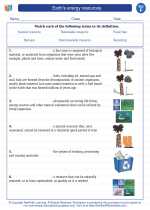Soil
Soil is a complex mixture of organic matter, minerals, gases, liquids, and countless organisms that together support life on Earth. It is a crucial component of the Earth's ecosystem, providing a medium for plant growth, regulating water flow and quality, and serving as a habitat for a wide variety of organisms.
Composition of Soil
Soil is composed of mineral particles, organic matter, water, and air. The mineral particles are derived from the weathering of rocks and minerals. Organic matter includes dead plant and animal material, as well as living organisms such as earthworms, insects, and microorganisms. The water and air in soil are essential for supporting the growth of plants and the activities of soil organisms.
Formation of Soil
Soil formation, or pedogenesis, is a slow process that occurs over hundreds to thousands of years. It involves the physical and chemical weathering of rocks, the input of organic matter from decaying plants and animals, and the activities of soil organisms. Factors such as climate, topography, parent material, organisms, and time all play a role in the formation of soil.
Functions of Soil
Soil performs several important functions in the environment, including:
- Providing a medium for plant growth
- Regulating water flow and quality
- Filtering and buffering pollutants
- Serving as a habitat for a wide variety of organisms
- Supporting human activities such as agriculture and construction
Importance of Soil Conservation
Soil is a finite and non-renewable resource that is vulnerable to degradation from human activities such as deforestation, overgrazing, and improper agricultural practices. Soil conservation is essential to maintain the productivity and sustainability of the Earth's soil resources for future generations.
Study Guide: Soil
- Define soil and explain its composition.
- Describe the process of soil formation and the factors that influence it.
- List and explain the functions of soil in the environment.
- Discuss the importance of soil conservation and the threats to soil sustainability.
- Identify and describe the different layers of soil (topsoil, subsoil, etc.)
Use the information provided to answer the study guide questions and deepen your understanding of the topic. Good luck!
[Soil] Related Worksheets and Study Guides:
.◂Science Worksheets and Study Guides Sixth Grade. Earth's energy resources
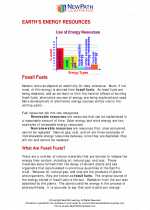
 Worksheet/Answer key
Worksheet/Answer key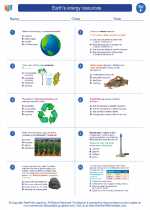
 Worksheet/Answer key
Worksheet/Answer key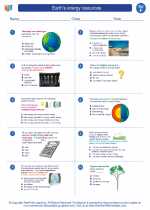
 Worksheet/Answer key
Worksheet/Answer key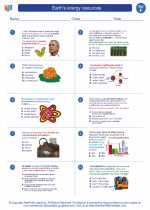
 Vocabulary/Answer key
Vocabulary/Answer key